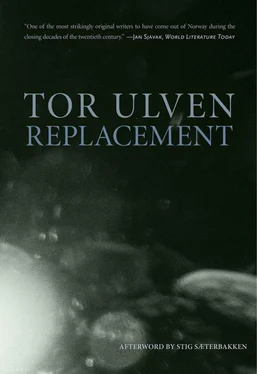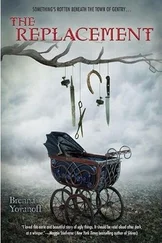Like white cliffs in the morning sun, right after the intersection with the two gas stations (competing businesses, one on each side of the street; a man in blue overalls is spraying down the asphalt with a long rubber hose in front of one), the massive high-rises, which seem lifeless and abandoned, a kind of gigantic monument of the past, temples, ziggurats, or mausoleums that cause explorers to speculate on why they could have been built and what function they might have served. Carefully, you slide your hand down into the brown bag and fondle the butt, with its well-rounded, ergonomic form, and your fingers close joyfully around it before you heft it, testing its weight, before abruptly letting the weapon drop back into the bag, without a sound, and instead rest your hand on the thick, padded door handle. You’re glad you know how to hold your tongue, otherwise they would’ve just laughed at you. You know the name of the island backward and forward, all of its weak, rolling vowels, like undulating waves, and the bungalow is supposed to be up the hillside a ways, with a view of lush green lava-formed ridges, and with the beach down below, located just a few minutes away down a winding path, a nice, leisurely stroll, you think, in the tropical warmth, which allows the perpetual use of shorts and sandals and a loose, short-sleeved shirt covered in flowers.
They work around the clock, probably to keep the ovens going: brown smoke floats on the spring breeze. You’ve seen the gigantic portal crane lower its circular magnet toward the veritable cairn of scrap metal, an amorphous pile of twisted shapes, old machinery, car wrecks (you take a moment to ponder whether the car you’re sitting in will ever end up there), tin plates rusted through, ruined vats, and so on, together with a random assortment of other pieces of metal, some larger, some smaller, whose original function is impossible to guess at now, and if someone told you the scrap-metal mountain was the result of an explosion, a terrorist bombing, a city at war, with such scrap pouring in day and night, the result of the perpetual war, you’d almost believe it; and it has a surprisingly subtle spectrum, which runs the gamut from soot black to snuff brown to brick red, though the predominate shade is dark brown, so that one could argue that the scraps are actually colorless, just as (until they’re smelted down) they’re functionless, superfluous; and you recall how the crane’s heavy, circular magnet was lowered like a safety harness from a helicopter toward the scrap heap, and how the powerful electric current was switched on (presumably by the crane’s operator, who sits in a compartment, like someone in a tree house, up at the top of the crane), so that a prescribed amount of scrap metal instantly became stuck to it, like pieces of Styrofoam stick to your fingers and are almost impossible to shake off (because of static electricity); at this point in the process, the crane would lift a trembling assortment of metal fragments off the large pile (although each time you’ve also noticed that a few pieces at the very bottom manage to free themselves from the magnet’s magical sphere, tumbling the few meters to the scrap heap below), up to a predetermined height, and (free now of hindrances) the crane (its huge portal shape spanning the factory complex) began to roll, accompanied by the squeaking, rumbling whine of its motors and other movable parts, especially from where its massive wheels met the tracks; at which point, when that crow’s nest of scrap metal had reached its target behind the foundry’s walls (something the crane operator could obviously judge from his vantage point on high), it was swiftly dropped straight down through a massive hole, where a fire was burning, you recall seeing the flickering reflection of flames and the puffs of smoke up along the walls; if you were more imaginative or more poetically inclined than you actually are, you could’ve compared the process to the descent of dead souls (the bits of scrap metal) into purgatory (the foundry), where, after a period of time, they’d emerge again in renewed, changed (purified) form, but that old-fashioned, forgotten symbolism simply doesn’t occur to you.
The capital. You’ll obviously have to take a boat to the capital every now and then to withdraw money from your account (the island might have its own bank, you’re not sure), to make any special purchases, swing by a bar, a restaurant, a brothel (if necessary), but otherwise you’ll spend your days swimming, sailing, fishing, organizing a shell collection, building a ship in a bottle, gathering breadfruit and hacking coconuts open with a machete, wandering along the beach, strolling through the woods, sitting on the terrace, sipping a drink while reading newspapers and magazines out of date by a week, a month, reading about events and people that don’t concern you now and that will never concern you again.
The men who are starting their workday or continuing their workday even before the day’s really begun, down there in the scorching heat and metal fumes, you imagine them sweating and toiling away, protecting their eyes with glasses, their heads with helmets, their faces with masks, their hands with asbestos gloves, their feet with steel-toed boots, their lungs with dust-absorbent cloths, down there in blue-collar hell, clueless idiots torturing body and soul for every red cent, and the worst of it, you think, is that they can’t imagine doing anything else, they can’t even fantasize about living a life without work, they’d never accept a paycheck for sitting on their asses (when people like that have a day or even half a day free, they throw themselves into any number of other projects, like carpentry, painting, wallpapering, brick or tile laying, car repairs, roof repairs, weeding, ditch digging, woodcutting, hedge clipping, lacquering, insulating, welding, finishing basements, furnishing attics, and so on, with a frenetic urgency, you’ve seen it, as if they’d been diagnosed with chronic work syndrome and knew their bodies would crumble to a fistful of dust if they stopped moving even for a moment) and therefore, you think, they don’t understand the true value of money, they think it’s only good for buying things, whereas, you realize, with a sudden flash of insight, what it actually guarantees is freedom from work (presuming you’ve got enough of it), from any and all work; a smile tugs at the corner of your mouth as you drive by in your taxi and think of all the stupid idealists who’d rather slave for the state than for a private firm, who think it’s better to crawl on their bellies through public shit than make a living crawling through private shit, who believe hauling a res publica baby grand up five flights of stairs will give you less of a backache than a commercially owned piano, and you smile as you think of all the people bitching and moaning about unemployment, as if idleness, not work itself, were the problem, as if standing in line to get by was more grueling than trying to maintain an earnings account (with all its attendant pleasures); all those idiots, you think, who don’t understand the fact that work itself should be abolished, who haven’t even tried to abolish it in their own lives. Sleepwalkers. Mice. Mice on little pink plastic wheels in a pet-shop window, mice expending useless energy on machinery owned by somebody else.
When the taxi starts up again, your head is sucked back against the seat, so your chin juts straight out, and the shopping center, which is still closed, vanishes behind you. Without taking the weapon out, you (silently) undo the safety and curl your pointer finger halfway around the trigger, just a hint at the gesture that will for now remain unfinished. Then you withdraw your hand from the bag. You see the driver looking at you in the rearview mirror, when he’s not keeping an eye on traffic, that is, but he seems to be watching your face (which probably looks flat and preoccupied; perhaps he mistakes you for one of the very few veteran drug addicts who’ve managed to reach their mid-forties), more than your hands. You tell him that you’ve changed your mind, that you don’t need to go all the way to the forest’s edge, that instead you can get out at the first bus stop (you point) after the light.
Читать дальше












